- Home
- Jade Astor
Serpent's Gate Page 3
Serpent's Gate Read online
Page 3
“That’s just the sort of challenge I look forward to. I’d be happy to accept your invitation. I’ll have to bring my nephew along, of course. I couldn’t even consider taking on a project of that magnitude without the benefit of his computer expertise.”
“He is most welcome. The cottage will be perfectly comfortable for two.”
Scuffing sounds alerted his that they were rising from their chairs. Stephen hurried back to his desk and pretended to immerse himself in work. His cheeks flushed with gratification—and not a little guilt—that Uncle Vernon considered him so indispensable.
“Most young people are proficient with such machines these days,” Uncle Vernon was saying as they strolled from the office. “I might venture to say that they are obsessed with their gadgets—until they need to type their essays or do research for school, of course. Then their enthusiasm fades rapidly, or so my retired professor friend tells me.” He paused and glanced at the book cataloguing software filling Stephen’s screen. Stephen turned to find Malcolm Argyle smiling down at him.
“Nice to see someone using a laptop for something other than social media for a change. Not that I expected any less from a member of the Carlyle family.”
“Stephen has just finished a business degree at the university, and I can tell you he’s been a great help to me here in the store. I expect he will be even more useful with respect to your collection.”
“I look forward to it.” Mr. Argyle thrust out his hand. “So my client will see you this Saturday? Say, ten a.m.?”
“Ten it is. Delighted to oblige.” Uncle Vernon was beaming as luminously as Stephen had ever seen, and his grin didn’t fade a watt as Malcolm Argyle left the store and strode briskly down the sidewalk. “Look at him, Stephen. A gentleman through and through. Highly educated, charming, and well-bred to boot. That’s a combination too seldom seen nowadays.”
“So we’re going to a cottage for the weekend?” he asked aloud.
Uncle Vernon’s white brows arched behind his glasses. “Eavesdropping, were you?”
“I could hear you through the door. I heard about his cousin’s death, and Roark Fairbourne’s book collection, and how he needs to sell it off to keep the joint solvent.”
“Essentially accurate, though not in every detail.” Uncle Vernon sniffed. “You are correct that we will be spending some time in Mr. Fairbourne’s library this weekend. Imagine the books he must have there! We’re not likely to see a collection like that again, at least not in my lifetime.”
“But what about the store? Saturday is usually our busiest day.” Stephen didn’t say what else he was thinking—what if the Coleridge fan came back to look for another book while he was away with Uncle Vernon?
“I’m sure Geoffrey can run things for two days. He cannot deny that it’s a marvelous opportunity for both of us.”
“Great.” Stephen tried to sound enthusiastic for Uncle Vernon’s sake. Though a weekend getaway sounded appealing, sorting out musty old books at someone else’s house sure didn’t.
The shop door opened noisily. Geoffrey rushed in, bow-tied and buttoned up as usual. This time his cheeks burned dark pink and his wiry salt and pepper hair practically stood on end.
“Vernon, you won’t believe who I just saw strolling past the bakery. I’m sure this will sound crazy, but I’m sure I’m not mistaken. I’ve seen his picture in the paper many times.”
“Were you going to say Malcolm Argyle?” Uncle Vernon beamed. “If so, you’d be correct. It seems we’re coming up in the world, Geoffrey. Stephen and I have been asked to take on a most extraordinary project this weekend. In fact, I was hoping you could do me a fav—”
“He was here?” To Stephen’s surprise, Geoffrey seemed nowhere near as enthusiastic as Uncle Vernon. In fact, he appeared downright horrified. “Vernon, don’t you know? Malcolm Argyle works for the Fairbournes, and he’s one of them as well. Please tell me you didn’t accept his invitation!”
“Of course I did. Honestly, Geoffrey, get hold of yourself. A summons to Fairbourne House is a great honor. I’m astonished you don’t see that.”
“But you know that place’s reputation—the things that have gone on there!”
“On the contrary, I know nothing of the kind. It’s an old house, certainly, and no doubt it’s seen its share of scandal. But I see no reason to avoid it now.”
In desperation, Geoffrey turned to Stephen. “Stephen, you must talk sense into your uncle. You cannot go to that house. Either of you!”
“What? Why not?” Stephen asked, open-mouthed. He’d never seen Geoffrey so riled up—not even when he was blathering on about his unrequited passion for Uncle Vernon.
“Yes, Geoffrey, do enlighten us.” Uncle Vernon’s cheerful enthusiasm had vanished. His tone had become taunting, even slightly menacing. “As a scholar of local history, you clearly have plenty to say on the matter.”
“I can’t believe you have to ask me—you, Vernon, with a family connection to this area that stretches back centuries. You know very well what people say about the Fairbournes, and have been saying for years.”
“Apparently, I am not as tuned in to scurrilous gossip as you, Geoffrey. Would you be kind enough to enlighten Stephen and me—assuming, of course, you can avoid embarrassing yourself in the process?”
The pink in Geoffrey’s cheeks flamed red. “I feel no shame in giving a friend a timely warning, Vernon. If you choose not to listen to me, I fear you may be the one who ends up embarrassed. But then, embarrassment is likely to be the least of your problems at Fairbourne House.”
“I still don’t get it,” Stephen said, looking from one seething elderly man to the other in bewilderment. “What happened at Fairbourne House?”
“Terrible things,” Geoffrey intoned solemnly. His blush faded, his face tensing instead with a steely resolve overlaid with outraged anger at being mocked. Stephen could see why Uncle Vernon’s disdain had hurt him, but as usual he couldn’t understand why the two of them insisted on talking at cross-purposes all the time. “Crimes going back a hundred years or more. Crimes for which no one ever paid the price, much less expressed even a sliver of regret or remorse.”
“Crimes? What kind of crimes?”
“Geoffrey is referring to events that took place long ago, in a time very different from our own,” Uncle Vernon stated firmly. Stephen half expected him to punctuate his words by stamping his foot. Thankfully, he settled for a haughty clearing of his throat. “Obviously, he cannot perceive the difference between the Fairbournes who occupied the house in some previous century and those who live there now. If the exemplary man who just left here is any indication of the others we will meet at the house, I look forward to our journey very much indeed.”
“Exemplary man? Vernon, the fellow I passed on the street is merely one recent branch from the trunk of a very long, very dark, and very twisted tree. It’s true that two centuries might have passed, but the Fairbournes are no different now than they have always been. They have no compunction about using others to perpetrate their heathen schemes and satisfy their craven lusts.”
Stephen tilted his head as he listened. Heathen schemes didn’t pique his interest, mostly because he wasn’t sure what exactly they were, but craven lusts sounded kind of promising.
“What have they done, exactly?” he asked Geoffrey.
“They’ve done nothing at all,” Uncle Vernon insisted before Geoffrey had a chance to respond. “As Mr. Argyle himself implied, the rumors against them have been based on nothing more than typical bourgeois envy and superstitious ignorance. As far as I am concerned, they are guilty of nothing more than living a manner befitting those who possess more than modest wealth. Surely you advocate the promotion of culture, Geoffrey? If not for families like the Fairbournes, we would have blessed little of it left indeed.”
“I have no doubt their collections of art, antiques, and vintage books are quite impressive,” Geoffrey insisted. “Superficially, they are a refined and attractive lot. That
makes them all the more dangerous.”
“Oh, for heaven’s sake,” Vernon said, waving his arms in frustration.
“Can someone please just tell me what they’re supposed to have done?” Stephen asked. “You’re talking like they’ve murdered someone and carved the poor guy up for dinner.”
“That’s not far from the truth, metaphorically speaking,” Geoffrey said, while Vernon rolled his eyes and scoffed. “Since the end of the nineteenth century, they have been involved in at least one abduction and murder, and one suspicious death. Several other people have been foolish enough to go into that house and came out gibbering mad. The most recent dead of the family, Owen Fairbourne, among them.”
“Really?” Stephen recalled what Malcolm had said about his cousin dying of an illness in the mind. At first he’d interpreted that to mean a brain tumor or maybe some form of dementia. Did he really mean the guy had become a raving lunatic, as the authors of Uncle Vernon’s antiquarian books might have put it?
“None of them were ever brought to justice, which shows you the power of fear combined with money,” Geoffrey went on. “But to this day, the townspeople shun them. Why do you think Malcolm Argyle had to drive for an hour to find someone to evaluate his books? You don’t think there are antique experts closer to Fairbourne House, experts who would be happy to take on such a lucrative project? He knew what all of them would, and probably did, say.”
“That’s wild,” Stephen said. It sounded like something from the Middle Ages, or maybe the Salem Witch Trials. He did remember that stuff from college, at least. “You make it sound like they dabble in black magic.”
“If only that was all,” Geoffrey intoned mysteriously.
“All right, that’s enough.” Uncle Vernon’s voice shook with barely contained fury, the kind he usually reserved for when Stephen broke a binding on one of his rare books or a customer smuggled one out without paying. It didn’t happen often, but when it did, Uncle Vernon was a sight to behold. “Geoffrey, your insinuations are nothing more or less than ridiculous, and frankly I’m surprised a man of your intellect would wallow in such juvenile tittle-tattle. As it happens, I had planned to ask you to mind the shop while Stephen and I were away, but now I see what a foolhardy gesture that would be. I will simply close the place up for two days and take the loss to my till. Better that than leave my family legacy in untrustworthy hands.”
“Are you implying that I am incapable of running Carlyle Books for a weekend?” Geoffrey sputtered, outraged. “I, who have spent the better part of two years coming here almost every day? Why, I can virtually recite the contents of your shelves in order!”
“That may very well be so,” Uncle Vernon said haughtily, “but it is now obvious to me that you are possessed of a disordered mind. If you cannot respect my professional decisions, then you are clearly not the loyal customer I assumed. Good day to you, Geoffrey.”
With that, Uncle Vernon turned his back on them and stormed into his office. Geoffrey stared after him, dumbfounded. His hands began to tremble at his sides, and he shoved them irritably in his jacket pockets.
“He didn’t mean it,” Stephen said apologetically, wishing he could fade into one of those clouds of book dust he inevitably kicked up when he cleaned.
“As a matter of fact, I hope he did,” Geoffrey said through clenched teeth. They looked unusually shiny, and Stephen wondered if he’d gone to have them professionally whitened. Another gesture Uncle Vernon hadn’t bothered to notice. “Because if he didn’t, he has trampled our friendship to sawdust over nothing. I don’t blame you, Stephen. Good day to you, all the same.”
Stephen watched sadly as he swept dramatically toward the door. Before he stepped out, Geoffrey turned to scowl at him.
“You don’t want to believe the Fairbournes destroy everyone they come in contact with, do you? I should say what happened here is proof that they do. I know I have not convinced you any more than I have convinced your uncle—but when you go to the house, please be on your guard at all times. If the two of you enter that house, it’s entirely possible you’ll never come out.”
Uncle Vernon poked his head out of his office. His eyes still blazed with outrage. “Really, Geoffrey! This is utter nonsense.”
“Believe that if you must. I’ve said all I am willing to say on the matter to someone who refuses to listen. Vernon, I sincerely hope I will see you here again one day—alive.”
Then he hurried out, slamming the door with such force that Maynard Carlyle’s portrait rattled against the wall.
Chapter 3
Uncle Vernon spent most of their hour-long drive talking about the rise of commercial publishing and relating tales—rather tall ones, Stephen suspected—about their family’s adventures in the book-selling world. Having heard the stories many times before, Stephen knew when to murmur and nod and what remarks to make at exactly what intervals.
“Your great-great-great-great grandfather Maynard once watched Charles Dickens lecture,” he declared proudly. “Afterward, he attended a private party with some of the most prominent authors of the time in attendance. While they all took tea, Grandfather Maynard discussed the current state of American publishing with some of the authors. At one point he even made a prediction about the evolution of printing technology that left Dickens himself speechless with awe for a few minutes. Everyone was caught off guard by old Maynard’s insight.”
Stephen knew which questions to ask, too. “What was the prediction?”
“Unfortunately, no one had the foresight to jot the particulars down,” Uncle Vernon admitted. “But the important thing is that Grandfather Maynard made an impression on everyone present, and I’ll bet Dickens remembered that night for the rest of his life. I wouldn’t be surprised if he worked the incident into one of his stories, though I haven’t quite figured out which one.”
“I’m sure you’re right,” Stephen said.
“Bottom line, Grandfather Maynard knew books like nobody’s business. You come from an illustrious line of highly selective booksellers, Stephen, and I hope you won’t ever forget that—unlike certain unnamed members of our family.”
“I won’t, Uncle Vernon,” Stephen promised. He knew Uncle Vernon was referring to his father, who had scandalized the family by moving a few hours east and opening a restaurant. In hopes of changing the subject, he studied the scenery passing by the window. They were driving down a tidy street lined with trendy cafés, art galleries, and high-end specialty shops.
“Overpriced junk, if you ask me,” Uncle Vernon said as they passed a shop displaying dozens of stained-glass wind chimes shaped like colorful birds and butterflies. “True, some of it might be made by hand, but it can’t compare to real antiques. Not made to last, that’s for sure. How much of this junk will be around in a hundred years? The whole idea is to get people to buy more and more of it, not keep it around for the enjoyment of future generations.”
“Do you think the Fairbournes have a hot tub?” Stephen asked as a sign advertising a high-end spa flashed by. Not an antique book in sight there, he suspected.
“If they do, we won’t be using it. We’re visiting Roark Fairbourne’s books, Stephen, not him,” Uncle Vernon cleared his throat. “However I might personally feel about the sort of lifestyle people like the Fairbournes lead, there can be no doubt that their private library must be bulging with rare volumes. Not only do they have the space to accumulate and store their treasures, but their ancestors were wealthy—and wise—enough to invest in such things back when the average worker made pennies a day. Few would have wasted their money on fripperies like these.”
With a righteous sniff, Uncle Vernon pressed on the gas and drove on. The village and its upscale merchandise dropped behind them and soon disappeared from the rear view mirror.
Ahead lay curving hills that offered spectacular views of vast stretches of woodland and the wide, sparkling river that surged in the distance, running more or less parallel to the road. Now and then, Stephen spotted a v
acation lodge nestled in the cloud of pine trees. The wealthy guests probably sat on porches in the mornings sipping rich, fragrant coffee and watching the mist rise from the silvery water. Meanwhile, he and Uncle Vernon would be stuck inside shuffling around moldy books of dreadful poetry. Sometimes life seemed very unfair.
Eventually Uncle Vernon turned off the main road and headed down a road lined on both sides by lush greenery and towering trees. Stephen wondered if the Fairbournes owned the thick woods that bordered the property, too. Uncle Vernon’s was the only car.
This thicket soon gave way to another, narrower road, bordered on both sides by a plain of bright, closely trimmed grass that looked like soft green carpet. Straight ahead stood a tall iron gate, decorated with what looked at first like a thick black vine threaded through the bars. As they drew closer, Stephen realized the strands were actually the coils of a giant metal serpent. Its pupilless eyes gleamed gun-gray and malevolent, its sinewy coils looped through the bars as though it were readying itself to strike.
“Well, he we are,” Uncle Vernon announced as the car rolled to a stop. “Beyond those gates lies Fairbourne House.”
Stephen craned his neck. In the distance, past the gates, he glimpsed a large stone house shrouded in pinkish-gray mist. A single flat-topped tower rose above a broad, flat roof.
“I can’t imagine why they didn’t think to open the gate for us,” Uncle Vernon complained, tapping his fingers on the steering wheel. “Malcolm was quite specific about the time. Ten a.m. on the dot.” He checked his watch. “If I’m not mistaken, we have been unfailingly punctual.”
“Maybe we’re supposed to announce ourselves on that intercom,” Stephen said, pointing at a small black squawk box mounted beside the fist-sized iron hinge. Other than a small stone cottage that probably functioned as a gatehouse, set some distance behind the bars, he could see no other way inside the grounds. The place was as secure as a fortress.

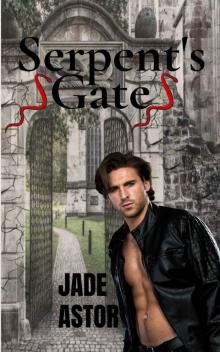 Serpent's Gate
Serpent's Gate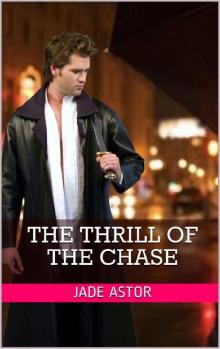 The Thrill of the Chase
The Thrill of the Chase Return to Warlock's Cove
Return to Warlock's Cove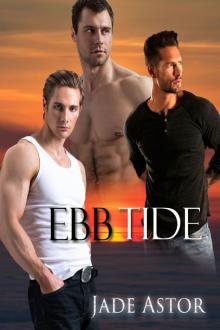 Ebb Tide
Ebb Tide Murder among the Palms
Murder among the Palms Single Vampire Seeks Consort
Single Vampire Seeks Consort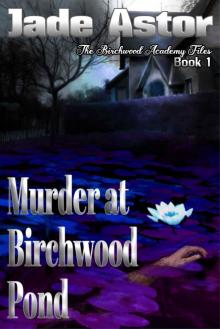 Murder at Birchwood Pond
Murder at Birchwood Pond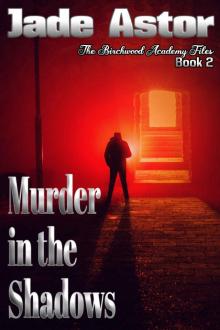 Murder in the Shadows
Murder in the Shadows![Lyrion's Gift [Elven Conceptions 1] (Siren Publishing Ménage Amour ManLove) Read online](http://i1.bookreadfree.com/i1/04/02/lyrions_gift_elven_conceptions_1_siren_publishing_menage_amour_manlove_preview.jpg) Lyrion's Gift [Elven Conceptions 1] (Siren Publishing Ménage Amour ManLove)
Lyrion's Gift [Elven Conceptions 1] (Siren Publishing Ménage Amour ManLove) morgan
morgan